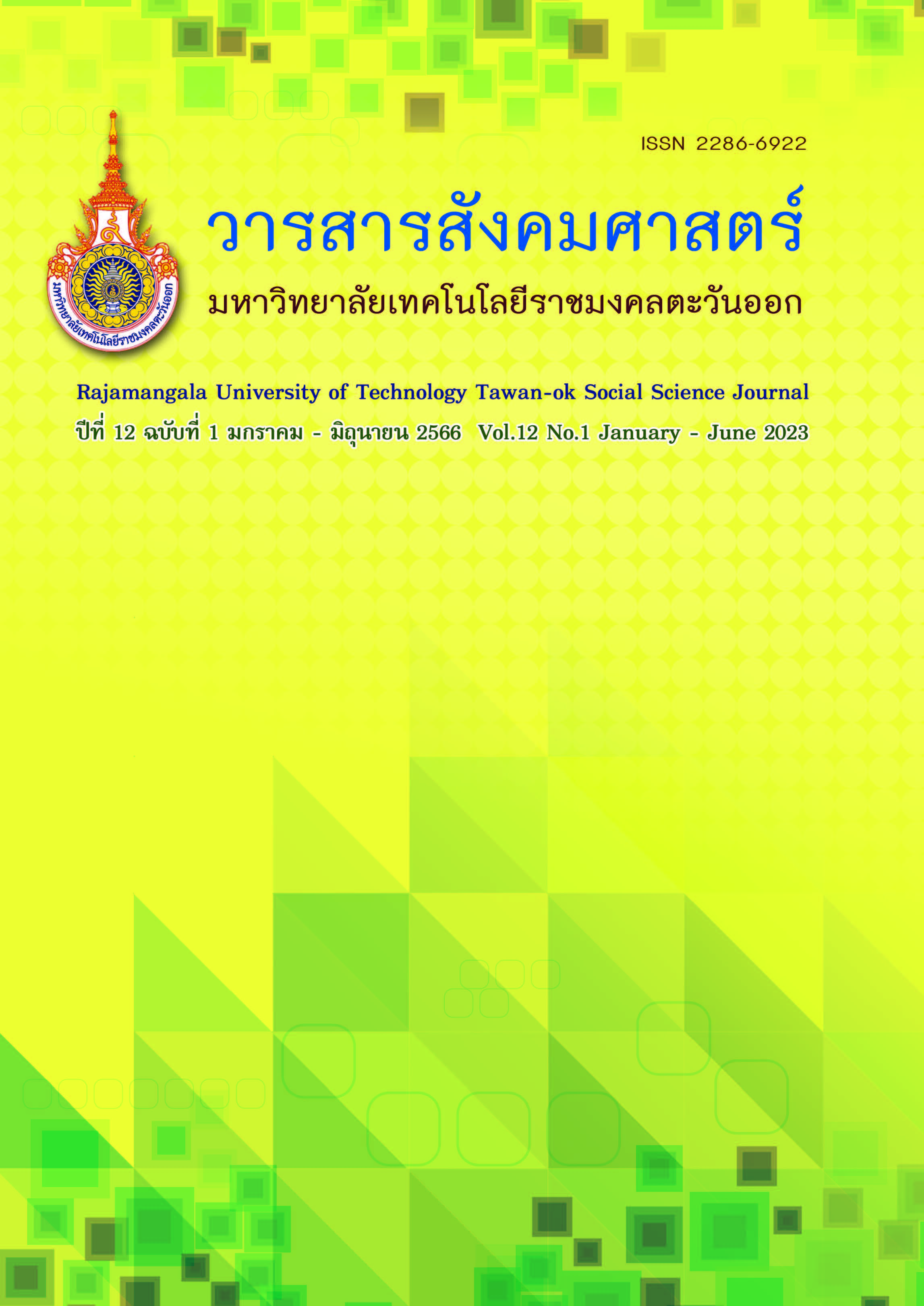A Study of Service Marketing Strategies of Long – Term Care Service Institution for the Elderly in Urban Areas and Bangkok
Main Article Content
Abstract
Research on the study of Service Marketing Strategies of Long-Term Care Service Institution for the Elderly in urban areas and Bangkok used quantitative method. The sample size used for this study was the elderly (who never used the service of an elderly care institution) in urban areas and Bangkok. The researcher used the purposive sampling method. The research tool was a questionnaire. The statistics used in the data analysis were descriptive statistics and inferential statistics. Demographic factors, psychological factors and service marketing strategies were analyzed by using frequency, percentage, average statistics, and standard deviation. Inferential statistics were used to test hypotheses and the test statistics were independent sample T-Tests, One-Way ANOVA: Analysis of Variance using F-Test statistic and Multiple Linear Regression analysis by Stepwise method. The results of the questionnaire found that most of the samples were female. The age range was between 60 - 64 years old. The current occupation was government service, having income between 20,001 - 30,000 Baht, bachelor's degree, and marital status. In terms of psychological factors, it was found that most of the elderly respondents give the first opinion in personality, saying that children and others in society must look at and feel elderly people are happy in the elderly care institution. In terms of service marketing strategies, it was found that most of the elderly respondents give the first opinion in personnel, saying that the staff in the elderly care institution should be trained to take care of all the elderly, including doctors and nurses, and should be available in the elderly care institution. The results showed that elderly with demographic characteristics of different age, income, education, status, and family characteristics affecting the service marketing strategies of long-term care institution for the elderly in urban areas and Bangkok are significantly different. Conversely, gender and occupation are not statistically significant. In terms of psychological factors, perception, learning, beliefs and attitudes, and personality of the elderly influencing the service marketing strategies of long-term care institution for the elderly in urban areas and Bangkok are statistically significant. On the other hand, the psychological factor of motivation is not statistically significant.
Article Details

This work is licensed under a Creative Commons Attribution-NonCommercial-NoDerivatives 4.0 International License.
References
กรมพัฒนาธุรกิจการค้าพาณิชย์ เร่งแก้ปัญหาการขาดแคลนธุรกิจดูแลผู้สูงอายุในไทย. สืบค้นเมื่อวันที่ 15 มกราคม พ.ศ. 2564: http://www.dbd.go.th/ewt_news.php?nid=469404775 &filename =Template _Design_Temp_Sub. Retrieved from https://www.dbd.go.th/
กรมอนามัย. (2557). สมุดบันทึกสุขภาพผู้สูงอายุ. กรุงเทพฯ: กระทรวงสาธารณสุข.
ชยุต รัชตะวรรณ. (2559). ปัจจัยที่มีอิทธิพลต่อการตัดสินใจเลือกใช้สถานบริบาลดูแลผู้สูงอายุเอกชนในเขตกรุงเทพมหานคร . วิทยานิพนธ์ (การบริหารธุรกิจสำหรับผู้บริหาร): มหาวิทยาลัยบูรพา.
ธิดารัตน์ เสาร์เรือน และกนกกาญจน์ เสน่ห์นมะหุต (2562) การวิเคราะห์แบบจำลองเชิงโครงสร้างของการตัดสินใจเลือกใช้บริการศูนย์ดูแลในกลุ่มเบบี้บูมเมอร์ (Baby Boomer). วารสารบริหารธุรกิจศรีนครินทรวิโรฒ.วารสารบริหารธุรกิจศรีนครินทรวิโรฒ ปีที่ 10 ฉบับที่ 2 กรกฎาคม – ธันวาคม 2562. http://ejournals.swu.ac.th/index.php/MBASBJ/article/view/11955
พิสิษฐ์ พิริยาพรรณ และคณะ (2558) การพัฒนามาตรฐานการดูแลสุขภาพผู้สูง อายุในศูนย์การให้บริการแบบพักค้าง. วารสารบูรพาเวชสาร Vol. 2 No. 1 (2015): JANUARY-JUNE 2015 https://he01.tci-thaijo.org/index.php/BJmed/article/view/119286
เล็ก สมบัติ, ศศิพัฒน์ ยอดเพชร และธนิกานต์ ศักดาพร. (2554). รายงานวิจัยฉบับสมบูรณ์ เรื่อง ภาวะสูงวัยอย่างมีคุณประโยชน์กับการพัฒนาสังคมและเศรษฐกิจในประเทศไทย. สำนักงานมาตรฐานการพัฒนาสังคม และความมั่นคงของมนุษย์ สำนักงานปลัดกระทรวงการพัฒนาสังคมและความมั่นคงของมนุษย์.
สถาบันวิจัยเพื่อการพัฒนาประเทศไทย (2557). การศึกษาผลลัพธ์ทางสุขภาพ และความเป็นธรรมทางสุขภาพ. กรุงเทพ: วิฑูรย์การปก.
ศศิพัฒน์ ยอดเพชร. (2552). บูรณาการระบบการดูแลระยะยาวสำหรับผู้สูงอายุ. (พิมพ์ครั้งที่ 1). กรุงเทพมหานคร: โรงพิมพ์ เจพริ้น 2.
ศิริวรรณ เสรีรัตน์ และคณะ. (2560). การบริหารการตลาดยุคใหม่ (ฉบับปรับปรุงใหม่). กรุงเทพ: บริษัทธรรมสาร จำกัด.
Alex Jingwei He and Kee-Lee Chou. (2017). Long-term care (LTC) planning is important in helping the older people tackle their future needs better. United Kingdom: Cambridge University Press.
Chandeovwit, W. (2013). Social and economic aspects of the elderly in Thailand. Malaysian Journal of Economic Studies, 50(2):193-206.
Cochran, W. G. (1997). Sampling Techniques (3rd. ed). New York: John Wiley & Sons.
Kirsty, H., Carl, T., Antony, A., Paul, E., Claire, G., Barbara, H., et al (2021) Understanding the staff behaviours that promote quality for older people living in long term care facilities: A realist review, International Journal of Nursing Studies, Volume 117,
Mignani, V., Ingravallo, F., Mariani, E., & Chattat, R. (2017). Perspectives of older people living in long-term care facilities and of their family members toward advance care planning discussions: a systematic review and thematic synthesis. Clinical interventions in aging, 12, 475–484. https://doi.org/10.2147/CIA.S128937
Praewpran Seetisarn (2017) Exploring the Key Issues Affecting the Adoption of Health Care Services for the Elderly in Bangkok, Mahidol University: Bangkok
Shin, So & Park, Jeong. (2017). Factors Influencing Quality of Life of Elderly Residents in Long-term Care Facilities. Journal of Korean Gerontological Nursing. 19. 113-124. 10.17079/jkgn.2017.19.2.113.
United Nation. (2015). World populations ageing 2015. New York: Author.
United Nations Population Fund. (2012). Ageing in the twenty-first century: A celebration and a challenge. New York: Author.


